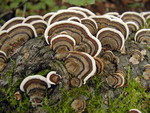
The Coriolus versicolor mushroom, commonly known as the Yunzhi mushroom, has been used in traditional Chinese medicine for more than 2,000 year. Some research has suggested that compound PSP has immune-boosting properties, though as yet there is very weak evidence for any anti-cancer effect.
Led by, Dorothy Cimino Brown from the University of Pennsylvania School of Veterinary Medicine, the researchers said the ‘promising findings’ offer hope that the compound may one day offer cancer patients — human and canine alike — a viable new ally in the battle against cancer.
"There have been a series of studies looking at groups of people with cancer,"Cimino Brown said. "The issue with those studies is that they weren't necessarily measuring what most people would think is the most clinically important result, which is, do people taking PSP live longer?"
Based on the ultimate endpoints of how quickly the tumors progressed and how long dogs suffering from a natural form of cancer survived when given the supplement, the research team suggests that PSP supplementation may be effective in fighting the tumors.
"We were shocked," Cimino Brown said. "Prior to this, the longest reported median survival time of dogs with hemangiosarcoma of the spleen that underwent no further treatment was 86 days. We had dogs that lived beyond a year with nothing other than this mushroom as treatment."
Dog study
To address this critical question, Cimino Brown and her team began research in dogs suffering from naturally occurring hemangiosarcoma (an aggressive, invasive cancer that arises from the blood cells and typically affects the spleen.)
The team explained that 15 diagnosed with hemangiosarcoma were split into three groups of five, with each group receiving a different dose — 25, 50 or 100 mg/kg/day — of a formulation of PSP that has been tested for consistency and good manufacturing processes (I'm-Yunity).
Dog owners were instructed to give their dogs the supplements daily.
Each month, the owners brought their dogs to for follow-up visits. There, the researchers took blood samples and conducted ultrasounds to determine the extent that tumors developed or grew and spread in the dogs' bodies. The results of the researchers' trial suggest that the PSP supplement was effectively fighting the tumors.
There were not statistically significant differences in survival between the three dosage groups, though the median survival time was highest in the 100 mg group, at 199 days, eclipsing the previously reported median survival time.
The results were so surprising, in fact, that the researchers asked Penn Vet pathologists to recheck the dogs' tissue biopsies to make sure that the dogs really had the disease.
Cimino Brown said the team is now getting ready to pursue further trials of the PSP supplement in dogs with hemangiosarcoma to confirm and refine their results.





